
Health Equity
Scope & Guideline
Championing knowledge for a healthier tomorrow.
Introduction
Aims and Scopes
- Social Determinants of Health:
The journal emphasizes research on social determinants influencing health outcomes, such as socioeconomic status, race, and access to care, to understand how these factors contribute to health disparities. - Racial and Ethnic Health Disparities:
A core focus is the examination of health disparities among racial and ethnic groups, with an emphasis on systemic racism and its impact on health care delivery and outcomes. - Community Engagement and Participatory Research:
The journal promotes community engagement as a vital component of health equity research, advocating for participatory methods that include marginalized voices in health research and interventions. - Policy Implications and Advocacy:
Health Equity publishes research that informs policy and advocates for systemic changes to reduce health disparities, emphasizing the importance of health equity in public health policy. - Innovations in Health Care Delivery:
The journal explores innovative health care delivery models aimed at improving access and outcomes for underserved populations, including the use of technology and community-based approaches. - Intersectionality in Health Research:
Recognizing the interconnected nature of various social categories, the journal encourages research that examines how multiple identities (e.g., race, gender, socioeconomic status) intersect to affect health outcomes.
Trending and Emerging
- Mental Health and Trauma:
Recent publications have increasingly focused on mental health disparities, particularly in the context of trauma experienced by marginalized communities, underscoring the importance of mental health as a critical component of overall health equity. - Impact of COVID-19 on Health Equity:
The COVID-19 pandemic has catalyzed a surge in research examining its disproportionate effects on various populations, leading to a heightened focus on pandemic-related health inequities and the need for equitable responses. - Health Equity in Policy and Practice:
There is a growing trend towards research that connects health equity to policy implications, advocating for systemic changes in health care practices and public health policy to address inequities. - Community Health Worker Models:
Emerging themes include the effectiveness of community health worker models in promoting health equity, particularly in underserved populations, highlighting the role of community engagement in health interventions. - Intersectional Approaches to Health Research:
The incorporation of intersectionality in health research is gaining traction, reflecting a trend toward understanding how overlapping identities and social categories affect health outcomes.
Declining or Waning
- General Health Disparities Without Specific Context:
There has been a noticeable decline in publications addressing broad health disparities without specific contextual factors, as the journal increasingly favors nuanced discussions that incorporate intersectionality and specific social determinants. - Traditional Public Health Approaches:
Research focusing solely on traditional public health strategies, such as vaccination campaigns or disease prevention, without addressing underlying social determinants or equity frameworks appears to be decreasing. - Single-Disease Focus:
The journal's emphasis on single-disease studies is waning, as there is a growing recognition of the need for integrated approaches that address multiple health issues simultaneously, particularly within marginalized communities. - Historical Perspectives on Health Disparities:
Themes centered on historical analyses of health disparities are becoming less prominent, potentially due to a shift toward more immediate, actionable research that addresses current inequities. - Generic Health Interventions:
The publication of generic health interventions that do not specifically address the unique needs of diverse populations or consider cultural competency is declining, reflecting a move towards more tailored approaches.
Similar Journals
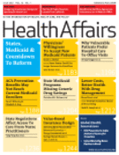
HEALTH AFFAIRS
Innovative Analyses for a Healthier TomorrowHealth Affairs is a premier journal in the fields of health policy and medicine, published by Project HOPE. With an ISSN of 0278-2715 and an impressive impact factor, this journal has established itself as a vital resource for researchers, policymakers, and healthcare professionals alike. Since its inception in 1981, Health Affairs has been dedicated to providing impactful research and analyses that shape health policy and practice, particularly in the United States. As a leader in the field, it holds a prestigious Q1 ranking in both Health Policy and miscellaneous Medicine categories for 2023, and it stands at an exceptional rank of #5 out of 310 according to Scopus' metrics, placing it in the 98th percentile among peer journals. Although it does not offer open access, its comprehensive studies and expert commentary make it an essential read for anyone committed to understanding and improving health systems worldwide. The journal's address is 7500 Old Georgetown Rd, Ste 600, Bethesda, MD 20814-6133.

COMMUNITY DENTAL HEALTH
Fostering collaboration for global dental advancements.Community Dental Health is a distinguished journal dedicated to advancing the field of public health and dentistry, published by F D I World Dental Press Ltd. Established in 1984, it has established itself as an essential resource for researchers and professionals by providing a platform for high-quality research, reviews, and case studies that address the critical issues surrounding dental health and its societal impacts. With an impact factor positioning the journal in the Q2 category for Dentistry and notable mentions in public health, it serves as a vital tool for those in academia and practice. The journal covers various pertinent topics, ensuring its relevance in an ever-evolving healthcare landscape. Although not open access, it remains accessible through institutional subscriptions, further supporting its role in disseminating significant findings within the scientific community. As it approaches its 40th anniversary in 2024, Community Dental Health continues to foster knowledge exchange, ultimately contributing to enhanced dental practices and better health outcomes on a global scale.
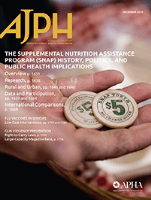
AMERICAN JOURNAL OF PUBLIC HEALTH
Bridging research and practice to enhance population well-being.The American Journal of Public Health, published by the American Public Health Association, stands as a cornerstone in the field of public health and epidemiology since its inception in 1949. With its rigorous peer-review process and a robust commitment to advancing knowledge and research practices, this journal holds a prestigious position in the academic community, as reflected in its 2023 Scopus ranking, where it is placed in the top percentile (93rd) within the categories of Public Health and Environmental and Occupational Health. The journal's focus encompasses a broad spectrum of public health topics, making it essential reading for researchers, practitioners, and students dedicated to improving population health. Subscribers can access invaluable insights through its collection of innovative studies and reviews, thereby reinforcing the journal's role in shaping public health policy and practice. By bridging research and real-world application, the American Journal of Public Health remains a vital resource for those engaged in the quest to improve health outcomes across diverse communities.

JNCI Cancer Spectrum
Transforming cancer insights into impactful discoveries.JNCI Cancer Spectrum, published by Oxford University Press, is a leading open-access journal dedicated to advancing the field of cancer research and oncology. With an impressive impact demonstrated through its Q1 ranking in both Cancer Research and Oncology categories for 2023, this journal provides a vital platform for disseminating high-quality research and innovative findings in a rapidly evolving landscape. Since its inception in 2017, JNCI Cancer Spectrum has embraced open access, enhancing the accessibility of evidence-based knowledge to researchers, professionals, and students across the globe. Additionally, it boasts notable positions in Scopus rankings, with a strong performance in both the Medicine and Biochemistry, Genetics and Molecular Biology categories. The journal is committed to its objectives of fostering collaborative efforts and encouraging dialogue among experts, making it an essential resource for anyone involved in cancer research.

Lancet Regional Health-Americas
Empowering Change Through Open Dialogue in HealthLancet Regional Health-Americas is a premier open-access journal published by ELSEVIER, dedicated to advancing knowledge in the fields of health policy, internal medicine, and public health within the Americas. Established in 2021, this journal has quickly risen to prominence, achieving Q1 status in renowned categories such as Health Policy, Internal Medicine, and Public Health, Environmental and Occupational Health as of 2023. With impressive rankings, including a placement of #25 out of 310 in Health Policy and #68 out of 665 in Public Health, this journal exemplifies a commitment to impactful research and dissemination of critical health knowledge. The journal is accessible to a broad audience and promotes open scientific dialogue and exchange of innovative solutions to regional health challenges. Researchers, professionals, and students alike will find Lancet Regional Health-Americas a vital resource for the latest developments and discussions shaping the health landscape in the Americas.
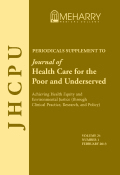
JOURNAL OF HEALTH CARE FOR THE POOR AND UNDERSERVED
Empowering the underserved with knowledge and research.JOURNAL OF HEALTH CARE FOR THE POOR AND UNDERSERVED, published by Johns Hopkins University Press, serves as a pivotal platform dedicated to advancing knowledge and research in the fields of public health, healthcare accessibility, and social determinants of health. With its ISSN 1049-2089 and E-ISSN 1548-6869, this esteemed journal has been at the forefront of addressing health disparities and improving health outcomes for marginalized populations since its inception in 1990. As a distinguished Q2 journal in Public Health and Environmental and Occupational Health, it ranks in the 36th percentile of its category according to Scopus, underscoring its relevance and impact within the academic community. The journal offers a range of articles, including original research, review articles, and case studies, focusing on innovative strategies and policies to enhance healthcare delivery for underserved populations. By contributing significant insights and evidence-based practices, the JOURNAL OF HEALTH CARE FOR THE POOR AND UNDERSERVED is an essential resource for researchers, health professionals, and students committed to fostering equity in healthcare access and outcomes.

Global Health Action
Elevating public health discourse for a better tomorrow.Global Health Action, published by Taylor & Francis Ltd, is a premier academic journal dedicated to advancing the field of global health, particularly in health policy and public health. Since its inception in 2008, this Open Access journal has played a pivotal role in fostering knowledge dissemination and collaborative research, allowing for a wider reach and engagement within the global health community. With a prestigious Q1 ranking in both Health Policy and Public Health, Environmental and Occupational Health categories as of 2023, it emphasizes high-quality, impactful research that addresses pressing global health challenges. The journal serves as a vital platform for researchers, professionals, and students to share their findings and insights, thereby contributing to the broader discourse on health equity, sustainability, and policy effectiveness. Situated in the United Kingdom, Global Health Action continues to lead the charge in promoting innovative solutions and evidence-based approaches to health issues worldwide, making it an indispensable resource for anyone committed to improving global health standards.
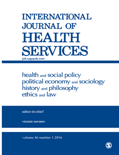
INTERNATIONAL JOURNAL OF HEALTH SERVICES
Catalyzing informed decisions for better health outcomes.The INTERNATIONAL JOURNAL OF HEALTH SERVICES, published by SAGE PUBLICATIONS LTD, stands as a vital resource for professionals and researchers in the field of health policy and management. Established in 1971, this journal has been instrumental in disseminating cutting-edge research, with a notable Scopus ranking of #65/270, placing it in the 76th percentile within its category. With its emphasis on empirical research and theoretical discussions, it aims to enhance the understanding of health service delivery systems globally. Though the journal's coverage has been discontinued in Scopus as of 2022, it continues to provide critical insights and facilitate scholarly conversation in the health services domain. Access to its articles is enable through various modes, allowing researchers and practitioners to stay informed on the latest developments and trends in health policy. The INTERNATIONAL JOURNAL OF HEALTH SERVICES not only serves as an academic forum but also as a catalyst for improving health outcomes through informed policy decisions.
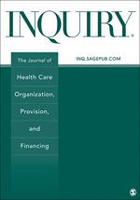
INQUIRY-THE JOURNAL OF HEALTH CARE ORGANIZATION PROVISION AND FINANCING
Pioneering insights into health care financing and provision.INQUIRY - THE JOURNAL OF HEALTH CARE ORGANIZATION PROVISION AND FINANCING, published by SAGE Publications Inc, is a distinguished academic journal that has been a vital resource in the field of health policy since its inception in 1972. With an impressive impact factor and categorization in Q2 of the health policy quartiles, this journal serves as a crucial platform for disseminating research that addresses the complexities of health care organizations, provision, and financing. Operating under an Open Access model since 2014, it ensures that knowledge is widely accessible, enabling researchers, professionals, and students to engage with cutting-edge findings and debates in health care delivery. With its ongoing commitment to advancing scholarship in health care systems, INQUIRY plays a pivotal role in shaping policy and practice, encouraging robust discussions that foster improvements in health care organization and financing structures.

MILBANK QUARTERLY
Advancing Health Policy Through Rigorous ResearchThe Milbank Quarterly is a preeminent scholarly journal published by Wiley that focuses on a range of vital issues in health policy and public health. With an impressive impact factor underscored by its Q1 rankings in both health policy and public health, the journal serves as an essential resource for researchers and professionals seeking to influence health systems and policies on a global scale. Since its establishment in 1986, The Milbank Quarterly has maintained a commitment to rigorous research and innovative analysis, and it continues to provide a platform for groundbreaking studies that address contemporary challenges in health care. Although it does not currently offer open access, the journal features a comprehensive review process that ensures the publication of high-quality articles aiming to inform policy decisions and elevate public health practices, confirming its status within the top ranks of its field.